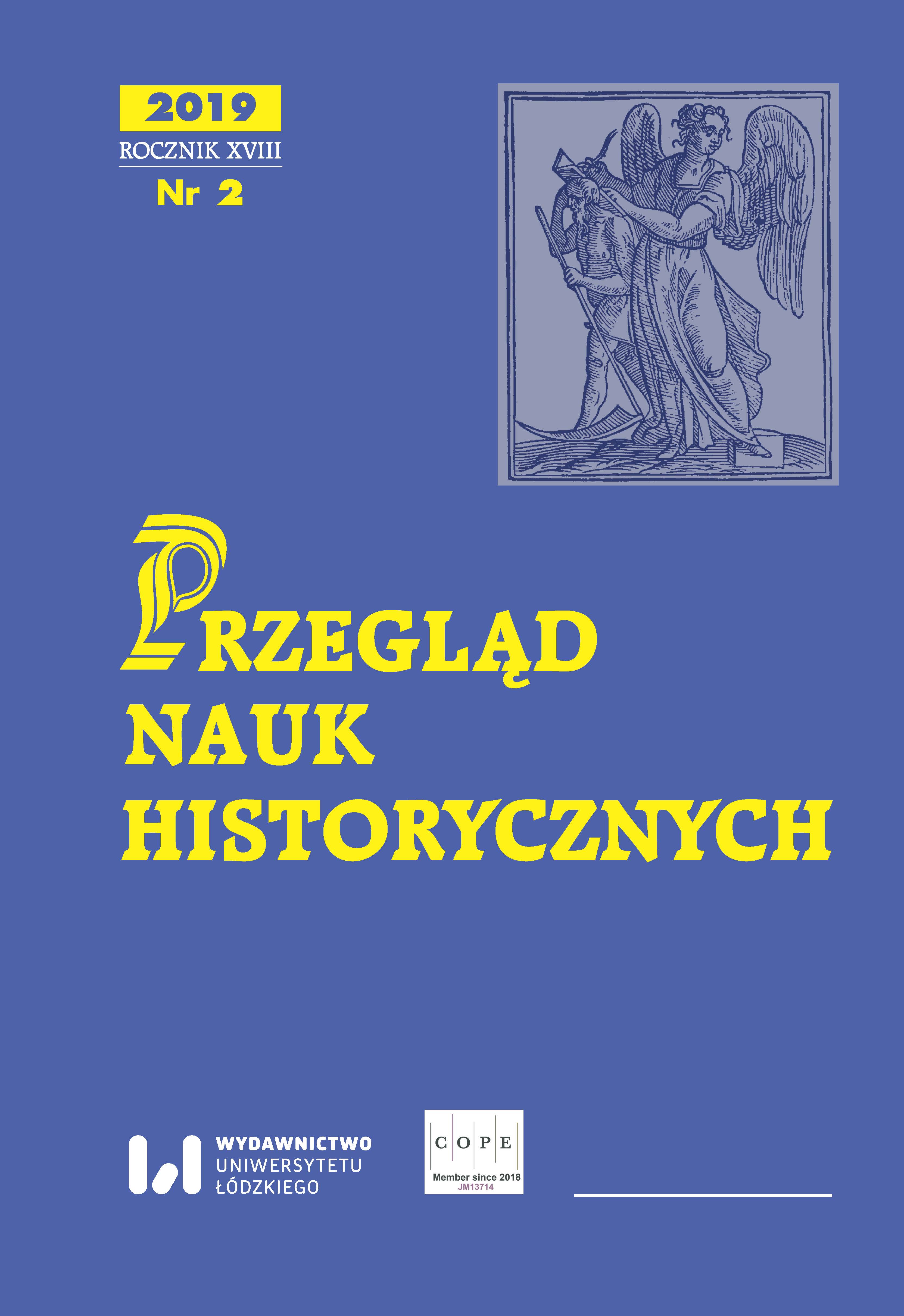The strength and powerlessness of Emperor Walens, a zealous Christian and an enemy of Christians at the same time in Socrates of Constantinople’s view
DOI:
https://doi.org/10.18778/1644-857X.18.02.07Keywords:
Emperor Valens, Socrates of Constantinople, battle of AdrianopleAbstract
Emperor Valens, who ruled in the years 364–378, is connected above all with the fateful disaster suffered by the Roman army in the clash with the Goths at Adrianople on 9 August 378, in which he himself found death. Christians, supporters of the Nicene creed of 325, read his sudden death as God’s punishment for the persecution of Orthodox Christians, whom they considered themselves to be. Socrates of Constantinople, author of Ecclesiastical History, which was a continuation of the work of Eusebius of Caesarea, noticed a contradiction in the conduct of Emperor Valens. The historian saw in him both an ardent Christian, who was zealous in his faith, and an enemy of Christians, who waged war against them. This contradiction was attributed by Socrates to the ruler himself, who, though convinced of his great religious zeal, had nothing to do with the principles of the Christian religion, which he should follow. As for the strength and powerlessness of the title, it must be said that Socrates of Constantinople believed that the power of Emperor Walens was only apparent, although much Christian blood was shed on his command. The powerlessness of this ruler was first exposed by the Christians persecuted by him, and ultimately by God himself, sending various cataclysms to the Roman Empire, and to Walens himself a death unworthy of the emperor without his due burial.
Downloads
References
Ambrosius, De fide ad Gratianum Augustum, [w:] Patrologiae cursus completus, Series latina, vol. XVI, ed. J.-P. Migne, Paris 1880, kol. 527–698.
Google Scholar
Ammianus Marcellinus, Rerum gestarum libri qui supersunt, hrsg. C.V. Clark, Bd. I–II, Berlin 1910–1915.
Google Scholar
Hieronymus, Chronicon, hrsg. R. Helm, Berlin 1956.
Google Scholar
Libanios, Orationes – Libanii opera, rec. R. Foerstere, vol. I–IV, Lipsiae 1903–1908.
Google Scholar
Philostorgius, Kirchengeschichte, hrsg. J. Bidez, bearb. F. Winkelmann, Berlin 1981.
Google Scholar
Rufinus, Kirchengeschichte, [w:] Eusebius Werke, Die Kirchengeschichte, hrsg. E. Schwartz, T. Mommsen, F. Winkelmann, Berlin 1999, s. 957–1040.
Google Scholar
Socrates, Kirchengeschichte, hrsg. G.C. Hansen, Berlin 1995.
Google Scholar
Sokrates Scholastyk, Historia Kościoła, tłum. S. Kazikowski, wstęp E. Wipszycka, kom. A. Ziółkowski, Warszawa 1986.
Google Scholar
Sozomenus, Kirchengeschichte, hrsg. J. Bidez, G.Ch. Hansen, Berlin 1995.
Google Scholar
Theodoret, Kirchengeschichte, hrsg. L. Parmentier, G.Ch. Hansen, Berlin–New York 2009.
Google Scholar
Barnes T.D., The Collapse of the Homoeans in the East, „Studia Patristica” 1997, vol. XXIX, s. 3–16.
Google Scholar
Barnes T.D., Constantine. Dynasty, Religion and Power in the Later Roman Empire, Oxford 2011.
Google Scholar
Bradbury S., Julian’s Pagan Revival and the Decline of Blood Sacrifice, „Phoenix” 1995, vol. XLIX, No. 4, s. 331–356.
Google Scholar
Bralewski S., Kanony kościelne w sporze między Wschodem a Zachodem na tle schizmy antiocheńskiej w IV wieku, „Acta Universitatis Lodziensis. Folia Historica” 2005, nr 80, s. 27–42.
Google Scholar
Bralewski S., Symmachia Cesarstwa Rzymskiego z Bogiem chrześcijan (IV–VI wiek), t. I („Niezwykła przemiana” – narodziny nowej epoki), Byzantina Lodziensia XXVII, Łódź 2018.
Google Scholar
Burns T.S., The Battle of Adrianople: A Reconsideration, „Historia. Zeitschrift für alte Geschichte” 1973, Bd. XXII, H. 2, s. 336–345.
Google Scholar
The Cambridge Companion to the Age of Constantine, ed. N. Lenski, Cambridge 2006. Cavallera F., Le schisme d’Antioche, Paris 1905.
Google Scholar
Devreesse R., Le patriarcat d’Antioche depuis la paix de l’Église jusqu’à la conquête arabe, Paris 1945.
Google Scholar
Drake H.A., Constantine and the Bishops: the Politics of Intolerance, Baltimore 2000.
Google Scholar
Girardet K.M., Der Kaiser und sein Gott. Das Christentum im Denken und in der Religionspolitik Konstantins der Grosse, Berlin–New York 2010.
Google Scholar
A Greek-English Lexicon, eds H.G. Liddell, R. Scott, Oxford 1996.
Google Scholar
Heather P., Moncur D., Politics Philosophy and Empire in Fourth Century Select Orations of Themistius, Liverpool 2001.
Google Scholar
Lançon B., Moreau T., Constantin. Un Auguste chrétien, Paris 2012.
Google Scholar
Lenski N., Failure of Empire: Valens and the Roman State in the Fourth Century A.D., Berkeley–Los Angeles–London 2002.
Google Scholar
Lenski N., Initium mali Romano imperio: Contemporary Reactions to the Battle of Adrianople, „Transactions of the American Philological Association” 1997, vol. CXXVII, s. 129–168.
Google Scholar
Lenski N., Valens and the Monks: Cudgeling and Conscription as a Means of Social Control, „Dumbarton Oaks Papers” 2004, vol. LVIII, s. 93–117.
Google Scholar
Liebeschuetz J.H.W.G., Antioch, City and Imperial Administration in the Later Roman Empire, Oxford 1972.
Google Scholar
Maraval P., Constantin, empereur romain et chrétien, Paris 2011.
Google Scholar
Marcone A., Costantino il Grande, Roma–Bari 2000.
Google Scholar
Marrou H-I., L’Église de l’Antiquité tardive 303–604, Paris 1985.
Google Scholar
Odahl Ch.M., Constantine and the Christian Empire, London–New York 2004.
Google Scholar
Rutowski B., Bitwa pod Adrianopolem (9 VIII 378 r.) i jej następstwa, „Meander” 1978, R. XXXIII, s. 525–539.
Google Scholar
Słownik grecko-polski, red. Z. Abramowiczówna, t. II, Warszawa 1960.
Google Scholar
Słownik grecko-polski, t. I, oprac. O. Jurewicz, Warszawa 2000.
Google Scholar
Słownik języka polskiego, red. W. Doroszewski, t. II, Warszawa 1960.
Google Scholar
Snee R., Valens’ Recall of the Nicene Exiles and Anti-Arian Propaganda, „Greek, Roman, and Byzantine Studies” 1985, vol. XXVI, s. 395–419.
Google Scholar
Wilczyński M., Germanie w służbie zachodniorzymskiej w V w. n.e., Oświęcim 2018.
Google Scholar
Williams S., Friell G., Theodosius the Empire at Bay, London 2005, s. 152–156.
Google Scholar
Downloads
Published
How to Cite
Issue
Section
License

This work is licensed under a Creative Commons Attribution-NonCommercial-NoDerivatives 4.0 International License.













